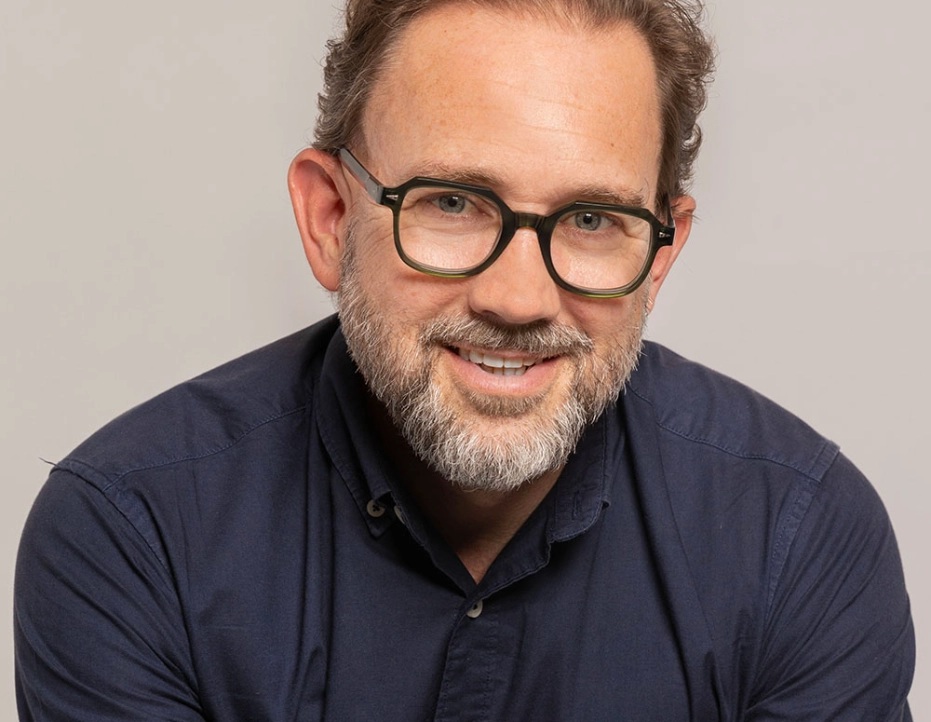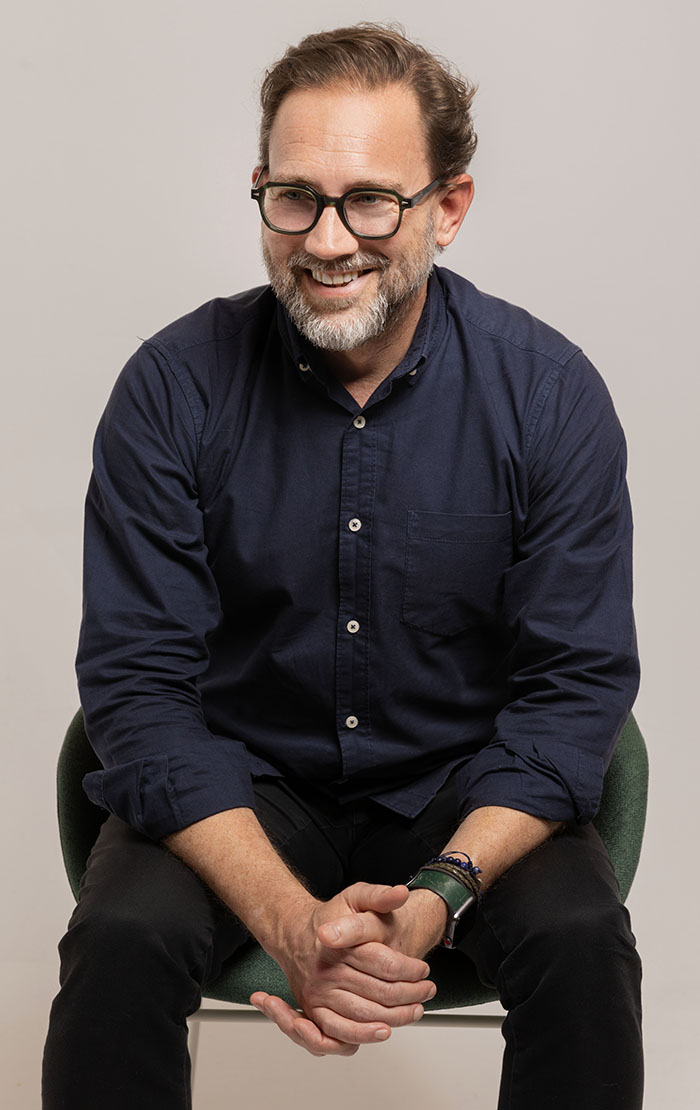Andrew joined B Lab as CEO after a career spanning commercial law practice and executive management roles, and running a family office and his own businesses in the finance and recreation industries. After working as an associate at Freehills between 1999 and 2002 and then for Baker & McKenzie, Andrew moved in-house to Repco, the reseller and supplier in the automotive parts and accessories aftermarket in Australia and New Zealand, as general counsel.
Eventually, the business was sold and delisted after which he spent 10 years dealing with a complex family operation started by his father-in-law’s business, which included winding up a finance business embroiled in longstanding litigation and taking over and managing an underperforming golf course and events company. Through his diverse experiences, he came to witness both good and bad business in practice, which motivated him to join B Lab in 2019.
“B Lab Australia and Aotearoa New Zealand (AANZ), of which I am the CEO, is part of the global B Lab network. B Lab creates standards, policies, tools, and programmes that shift the behaviour, culture, and structural underpinnings of capitalism. We’re best known for certifying companies - known as B Corps - that meet high standards of social and environmental performance, accountability and transparency.
To date, our global community includes over 9,000 B Corps in 105 countries, representing over 160 industries, and employing more than 87,000 people worldwide. There has been a huge increase in the number of Certified B Corporations in Australia and New Zealand, from just four in 2012 to over 730 in 2024, across 89 industries.
We also offer a free B Impact Assessment (BIA) to help companies measure and improve their social and environmental impact. More than 30,000 businesses use this tool globally.
Achieving B Corp Certification is no easy feat for a business, with stringent requirements around commitments and actions to effect positive environmental and social impact. Aside from the high environmental and social impact standards of the certification, participating businesses must also publish their impact profile and make a formal, legal commitment to being accountable to all stakeholders; a binding pledge that embeds a public benefit purpose and stakeholder engagement obligation into a company’s constitutional documents.
B Corps are businesses that are going beyond compliance to voluntarily be held accountable for their impact, and meet higher standards than ordinary businesses. This is the type of leadership we need from all businesses, and it goes against the increasingly outdated idea that businesses need fewer rules or standards to thrive.
The rapid growth in Certified B Corporations over the last two years reflects increasing recognition that our economic system needs to change. It’s no longer acceptable for businesses to pursue profits at the expense of people and the planet. Today’s profits shouldn’t become tomorrow’s problems.
Beyond that, the evidence is showing that businesses can be designed to achieve positive impact, and in so doing build resilience through economic cycles, fortified by aligned investors, deeper relationships with business partners, more engaged employees, and loyal customers.
Gaining B Corp Certification and committing to ongoing transparency and accountability shows employees, investors, customers and suppliers that the business is doing what they say they’re doing. In a world awash with false or exaggerated claims, being credible matters.
And it’s good for business
As Allegra says, businesses can be designed for positive social and environmental impact, as well as being sustainably profitable. Companies are responding, and the key is that they have to keep doing the work of improving themselves, keep striving to be better, as there is no fixed end destination: what it means to be ethical and sustainable continues to evolve.
Much of my motivation has stemmed from witnessing at close hand poor management across large and small businesses in my working life. All too often, I saw companies thinking purely in the short term, pursuing strategies that were at best temporary and at worst causing longer-term damage, particularly to the environment. I knew that there must be a better approach, which is why I joined B Lab.
Change starts with a simple but profound step: businesses need to articulate what their purpose is, then bake it in with a model that drives accountability to that purpose. Thankfully, many more are doing just that. There is some pushback, especially in the US, but that may be more in the way of a proxy political war in an increasingly polarised society. I hope in due course people will recognise the necessity for businesses to operate sustainably and ethically, and that will in turn sustain our economic system in a way that benefits society.
It is not sufficient simply for companies to say they are operating within the law, because the law is often behind the changes that are happening in society. The best companies are now acting proactively to be ahead of the changes in the law. Pushback mostly comes from those struggling with these new expectations, those unwilling to do the work, who unsurprisingly lead the call to ‘let business be business’ and simply operate without limits.
We at B Lab are helping to influence business by amplifying stories of business as a force for good, shifting the narrative on the role of business in society and working together to catalyse change in our economic system. That is a real challenge, but at the same time incredibly exciting.

It’s no longer acceptable for businesses to pursue profits at the expense of people and the planet. Today’s profits shouldn’t become tomorrow’s problems.
Positive role of law firms
We also see a strong role that law firms can take, by helping their clients think and act on models of accountability that see them elevate ethical and sustainable decision-making. In some instances, helping clients avoid liability is an essential part of legal practice, but, increasingly, stakeholders are expecting businesses to be accountable for their actions and impact. Navigating this line requires smart people who are tuned into both technical legal knowledge, as well as ideas of ethics in business.
We’re seeing businesses get recognised and rewarded by customers, investors, employees and wider society for embracing change. Good legal advice that brings this to life, that helps a business be accountable without exposing individual people to unreasonable risk of liability, is an important step to building a new economy where externalising negative impact is no longer the norm.
As an alumnus of HSF, I know that HSF guides some of the biggest corporations globally and the individuals that lead those corporations in executive teams and on boards. Helping those leaders find a path to make ethical and responsible decisions that also ensure their businesses thrive is both an important responsibility and also a huge opportunity. HSF can offer thought leadership on evolving directors’ duties, engage in policy debates, and share what their clients are grappling with in this space (within boundaries, of course, to take into account confidentiality!).
For alumni, I would like you to reach out to your clients or to your business partners to emphasise the benefits of sustainability. Tell your own stories of where decisions have been made with long-term factors, or broader considerations than short term profits in mind. Those stories enable more to act in this way.”
Features
Alumni Matters 2024
Start here
Introduction with Ben Ward
I am privileged to be taking over as a senior alumni ambassador
A view from Ho Chi Min City
There has been a transformation in Vietnam’s economy over the past three decades
Full AI immersion
'US top 40 under 40 lawyer’ Sam Clearwater explores the huge potential of AI
Partnering with the arts
Herbert Smith Freehills takes immense pride in our enduring partnerships with the arts
Blazing a trail in Australia
Reflections from Juliana Warner's 44 years at HSF
It's easy as ESG
Three alumni explore the plethora of ESG considerations businesses are facing
12 Questions with...Andy Raine
Deep dive into environmental law and his journey to the UN
Leading with a fresh perspective
Stefanie Wilkinson, Global GC of BHP, on managing a cross-country team for a large, complex business
In-house in-touch
The importance of really knowing your business
Calm amid the storm
HSF’s cyber risk offering: Help around the clock
The real importance of words
Maguelonne de Brugiere on the outstanding work of a charity that addresses verbal abuse of children
Networked for success
Helping young people foster skills for their future career
Lawyer to founder
Tara Grossman and Srin Madipalli have struck out into business, with their primary ambition to do good
Why I came back
Benjamin Lohr on what brought him back to HSF
Boardroom discussions
After 30 years on company boards, Nora Scheinkestel imparts wise advice on how to build a career as a non-executive director
Firm highlights 2024
Legal Notice
The contents of this publication are for reference purposes only and may not be current as at the date of accessing this publication. They do not constitute legal advice and should not be relied upon as such. Specific legal advice about your specific circumstances should always be sought separately before taking any action based on this publication.
© Herbert Smith Freehills 2024
Stay in the know
We’ll send you the latest insights and briefings tailored to your needs


